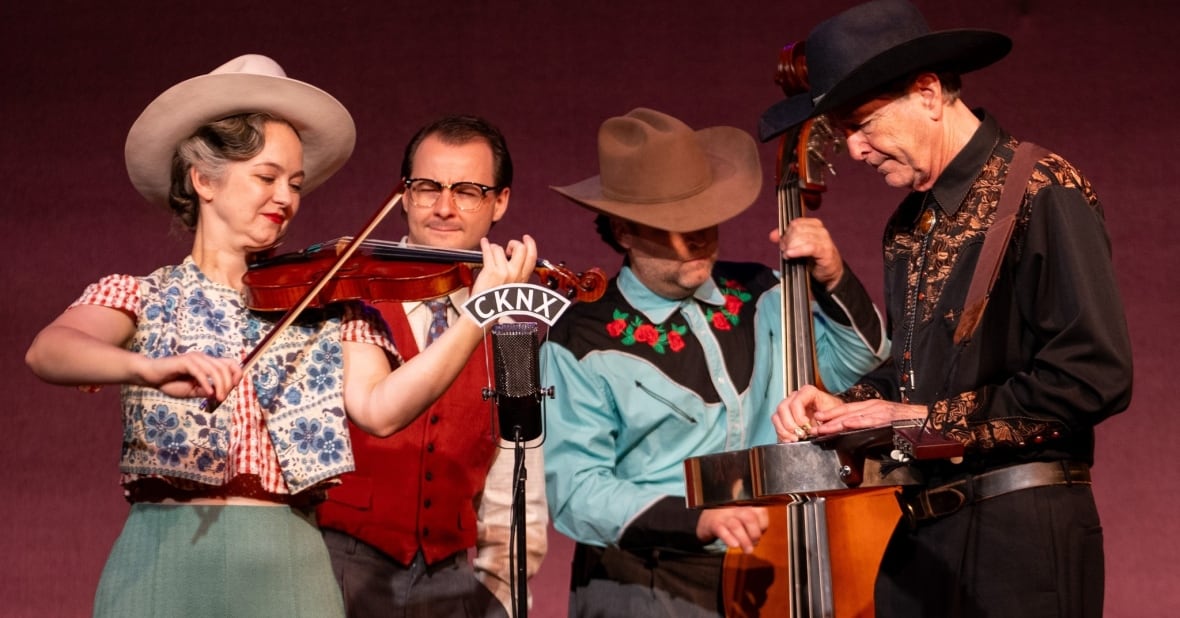Q&A: The true story of a Huron County radio trailblazer on at Blyth Festival

A true story of a trailblazer in broadcasting is on the stage at Blyth Festival.
Radio Town: The Doc Cruickshank Story tells the story of Doc Cruickshank, who went from building a radio transmitter in his garage to growing a successful radio and television station that is still running 99 years later in Huron County. The show is on at the festival until September 20.
CKNX is based in Wingham and is credited with launching the careers of artists like Shania Twain and Earl Heywood, hosting popular shows such as the National Farm Radio Forum and Saturday Night Barndance on the airwaves.
Playwright Nathan Howe spoke with CBC's Kate Adach on Afternoon Drive about bringing the play to life.
LISTEN: New play at Blyth Festival celebrates the beloved founder of CKNX radio
The interview has been edited for length and clarity.
Kate Adach: What first piqued your interest in the Doc Cruickshank story?
Nathan Howe: I was doing research on the music in Huron County because I'd put myself in charge of making the music for a show at the Blyth Festival that I was in 2018 called Wing Night at the Boot. And we went to the Barn Dance Museum, which was just being closed down. I was kind of amazed to see this music scene in this area of this small town that I was just getting to know.
Upstairs in the museum, there were TV cameras; There was a studio exhibit set up. I just had so many questions about this station and these entertainers that I couldn't stop reading about them.
KA: You're exploring the history of the cameras and the music at the museum. How quickly did you realize that this was because of Doc and that you wanted to tell his story?
NH: All questions lead to 'Where did this begin, and how did it happen?' And it all led to one person who was tinkering in his electronic shop and made a transmitter on a snowy night. Eventually, that became his whole life goal and purpose was reaching out to everyone in his area and creating a community of artists.

KA: When he was doing his first radio transmissions, do you have a sense of how far it would go, how wide the audience could be?
NH: They were getting letters from all over the place. I think during the early days, depending on the weather, they got a letter from Australia, someone had been able to hear them. So it was really cloud-dependent, but they were transmitting to the whole county, and they grew and grew and grew as the years went on.
KA: What can you tell us about those first broadcasts? How did they sound? What was on the air?
NH: Classic muffled sounding voices. Clarity was hard to find in the early days of all of that technology.
KA: What did it take to do the research for this? Where did you turn and what were you able to turn to?
NH: I went to the archives at the Huron Museum in Goderich. I went through newspaper archives and I talked to some people who still have memories of the place. Because of the live nature of broadcasting for both the radio and the television station, there isn't very much footage that has survived. So it was a lot of sleuthing, I suppose. And then, as with any play based on a true story, I got to condense 45 years into two hours. So, there's some amalgamating of facts and timelines.

KA: Tell me about how he went from radio to television.
NH: This was a man who was fascinated with technology and always ahead of the game, always reading and tinkering and researching. He felt that when television was on its way to Canada, he wanted to be on top of it because that's what his audience deserved to be ahead of the game with their media.
KA: Cruikshank played a role in launching the careers of artists like Shania Twain and Earl Haywood. We were talking about live music. What kind of music can people expect to hear in the play?
NH: It's good old time country and western music and some beginnings of folk through the years. You also hear the music evolve and change with the times. We end the show with the Mercy Brothers, and we begin it with Earl Haywood's earliest songs.
KA: Those who grew up with CKNX will be reliving cherished memories. Lots of like, 'Boy, I wish my grandma was still alive to see this.'
NH: It was a big, I mean, he changed the industry of the town into entertainment, and so many people who lived in Wingham or the area have all worked at the station or been very closely connected. So I was hoping to get a really local show on stage and I'm getting great feedback that it is.
KA: It sounds like you did. Thank you very much for chatting with us about this, Nathan.
Radio Town: The Doc Cruickshank Story is written by Nathan Howe and directed by J.D. Nicholsen.
cbc.ca





